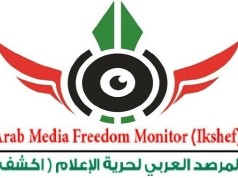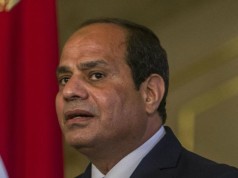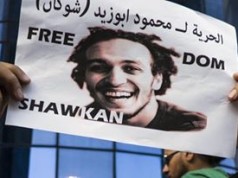
London – May 3, 2016
On World Press Freedom Day, Arab Media Freedom- Monitor “Ikshef” exposes the lack of press freedom in Egypt since the military coup on July 3, 2013. Unprecedented freedom of expression in the media and newspapers had been afforded to journalists on both sides of the political spectrum following the democratic election of Dr Mohamad Morsi. Supporters of the January 25, 2011 revolution, as well as opponents, enjoyed unrestricted freedom of expression. The military rulers are now gagging anyone who voices their discontent on TV, the preferred media for many Egyptians. Journalists and presenters have been pursued in and out of Egypt by the secret police. No consideration is given to Article 87 of the Egyptian Constitution that ensures freedom of speech and expression of opinion. Instead, journalists, TV presenters, columnists are incarcerated without charges.
On the 25th of April this year, 47 journalists and cameramen were rounded up and manhandled into awaiting lorries, simply for reporting on the demonstration of people objecting to the relinquishing of part of Egyptian territory to the Kingdom of Saudi Arabia by AbdelFattah El-Sissi without public consultation. Thugs were hired by the authorities to break into the Journalists’ Syndicate building to end the sit-in that was being held by wives and relatives of imprisoned journalists.
Press and media in Egypt face more restrictions being imposed on them, and they are turning into a directed media after the closure of 33 media outlets since July 3, 2013. 25 of which remain closed until now. Authorities have also prevented crews of some foreign TV stations from covering the event seizing their equipment.
For the first time in its history, the security forces stormed the Journalists Syndicate building in Cairo two days ago and arrested two journalists. They have been accused of writing articles objecting the selling of two islands opposite Sharm El-Sheikh to Saudi Arabia.
Below are some manifestations of the situation:
Imprisonment:
There are currently 87 jailed journalists, which, according to our estimation, make Egypt the top country in terms of imprisoning journalists globally and not in second place as was announced by some of the leading international organizations. This requires a great deal of international solidarity with those jailed journalists who suffer from extremely harsh conditions.
Murders:
11 journalists have been killed by the army and police, in addition to the two killed by armed groups (one in Sinai and the other in Libya). Their killers are still free, and the Egyptian authorities have made no real efforts to arrest the culprits so far. The current president Al-Sissi has stated during a TV interview that no officer will be prosecuted for killing anyone. The only case the authorities reacted to was of journalist Myada Ashram, who was killed by police on March 28, 2014 while covering anti-coup protests. Although there are documented testimonies by her colleagues that the police killed her, authorities arrested some protestors and accused them of the killing. Among those killed was Mick Deane, who was working for Sky News channel, he was killed in 14th of Aug 2013 as he was filming the security forces’ bloody dispersal of the anti-coup sit-in in Rabaa Square in Cairo. Nobody has been tried for that crime yet.
Violating the Constitution:
The authorities have been deliberately enacting legislation to restrict media freedoms, among them the Terrorism Act, which prohibits the publication of any reports that are contrary to the official reports and imposes huge fines on doing so. Other laws crack down on online activities, and there have been numerous gagging orders by the Attorney General and heads of the courts in major cases of public concern.
Closures and Confiscations:
At the moment there are 25 media outlets that remain closed in Egypt, including newspapers, TV and radio stations and websites. The list includes 11 Egyptian channels or that broadcast from Egypt (Misr 25, Al-Fraeen, Al-Hafez, Al-Shabab, Al-Khalijiya,, Safa, Al-Nada, Al-Rafedain,Al-Baghdadiya, Suria Al-Ghad and Folool). There are 5 closed offices of Arab channels (Al-Jazeera, Al-Jazeera English, Al-Jazeera Mubasher Misr, Al-Aqsa and Al-Quds). There are also two closed radio stations which are Radio Masrand Radio Tram. Moreover, there are banned online news networks Rassd and Yaqeen, besides the Islamtoday website, and Alexandria News Agency (ANA), and three newspapers (Al-Shaab, Al-Hurriya wa Al-Adala and Wasla(.
The confiscation of newspapers or their temporary closure continues after almost three years of the military seizure of power. Newspapers that have been disrupted or closed temporarily include Al-Masry Al-Youm, Al-Watan, Al-Omah, SoutAlomma, Al-Wady, Almesryoon, Youm7, and Al-Fath. Some of these newspapers were disrupted more than once because they contain materials that the authorities didn’t approve of.
Closing down some TV programs permanently or temporarily is still on-going, this affects state and private TV channels due to political backgrounds. Among those presenters who are still banned from hosting their programs so far are Bassem Yousef, Reem Maged, Yosry Fouda, Bilal Fadl and Mahmoud Saad, in addition to all the Islamic figures who were hosting programs or who were guests in both state and private stations.
Heavy Sentences in Publication Cases:
Jail verdicts in publication cases have increased against journalists in person or in absentia, both by criminal courts or military courts. We mention only two cases that are still underway, the first of which is the so-called “Chamber of Rabaa” case, which included 16 media figures. One has been sentenced to death and the others have been given life sentences. The Court of Appeal overturned those verdicts and case is still pending before a new court. The second case is related to Al-Jazeera TV station or the so-called “Marriott Cell”. The verdict dealt with 7 journalists in person with 7 to 10 years in prison. Among them were 3 accredited Al-Jazeera journalists Peter Greste, Baher Mohamed and Mohamed Fahmy, besides 4 freelancers. Another 11 persons were sentenced to 10 years in prison in absentia. Despite ending the case for Al-Jazeera journalists, the verdicts still exist against those who were tried in absentia.
In addition to those two major cases, there are many current accusations of spying, involving some journalists. Sentences were not only directed to journalists who are members of the Muslim Brotherhood and Islamists, but to liberals like Fatima Naoot, Youssef Shaaban, Ahmed Naji and Islam Al-Beheiry. The latter three are currently in jail.
Conditions of Jailed Journalists:
According to Ikshef’s latest figures, there are currently 87 journalists and field correspondents in Egyptian prisons, some of them are elderly over 60 years old, though the majority of them are young people. There were among the prisoners some women, some of them were released after completing their sentences, others’ cases are still pending.
Egyptian authorities claim that all jailed journalists belong to the Muslim Brotherhood and they are locked in criminal charges unrelated to their professional work. This is not true, evidenced by the fact that they include leftist, liberal and independent figures such as Ismail Al-Eskandarany, Mahmoud Shawkan, Youssef Shaaban, Hisham Jaafar, Ahmed Naji, Islam Al-Beheiry, Magdy Hussein, Omar Abdel-Maqsoud, and Saeed Abu-Haj. Let us also not forget that the charge of belonging to MB was directed to the Australian journalist Peter Greste!
Abuses:
Journalists are subjected to many abuses inside prisons in contradiction of prison regulations. This amounts to mental and physical abuse and sensory deprivation. Prisoners are denied their regular medications and those with chronic illnesses are denied regular check-ups and supervision. Prisoners are left for days without exposure to sunlight or EXERCISE. The cells are exposed to the seasonal changes of temperature because of the concrete floors that prisoners are left to sleep on without blankets in winter and aeration in summer. This torture is extended to the families of the detainees who have endured the chase until they eventually found which prison their kin have been incarcerated in. When that is achieved the relatives travel long distances with no guarantees they will be granted a visit. After overnight waits in front of the prisons, the lucky ones are granted no more than five minutes with their kin, separated by a thick glass, and enduring harassment and searches from brutal police officers. Often the female visitors are searched by male soldiers and asked for bribes to be let through.
Perhaps it is appropriate here to tell briefly about journalist Abdul-Rahman Shaheen, a freelance reporter for Al-Jazeera, condemned to a total of 31 years in prison after criminal and military trials related to publishing false news. This young journalist was arrested only 5 months after his marriage. He became a father (his son is now 18 months old). Shaheen has never been able to embrace his child even once because of the glass barrier, and the child who has never known his father is afraid to approach him.
Patients:
Magdy Hussein, Mohsen Rady, Hany Salah, Hisham Jaafar, Yousuf Shaaban and Mahmoud Shaukan have all been refused external hospital transfer even at their own expense by prison guards, despite the non-availability of their treatments in the prison’s rudimentary medical centres.
Prison authorities have threatened to bar all visitors to the detainees who have embarked on hunger strikes in protest about the conditions of their imprisonment.
Families’ Sufferings:
Wives of jailed journalists suffer severely, whether in shouldering family responsibilities, or on account of their jailed husbands. They are exposed to severe intransigence by prison police officers during visits after long journeys that take hours for some of them. Prison administrations don’t allow them to complete the visits in many cases, despite their attendance during official visiting hours. When allowing them to visit their husbands, it is only for short time that doesn’t exceed five minutes behind glass barriers. Moreover, the prison administrations often refuse to allow entrance (either completely or partially) to meals prepared for the prisoners by their families, sometimes throwing the food in trash bins.
The intransigence of the authorities towards the imprisoned journalists and to their families during their visits has led those families to start an open sit-in inside the Egyptian Journalists’ Syndicate since April 9, 2016 demanding the release of their loved ones.
On World Press Freedom Day, “Ikshef” calls again for the release of jailed journalists, both those serving jail sentences by court verdicts, or those who are on remand by orders of public prosecutors. “Ikshef” seeks the support of the international community to press for an improvement of conditions for these journalists; providing them with their basic human rights; enabling them to meet their families without barriers for adequate periods of time; and enabling them to access newspapers and different TV channels.




